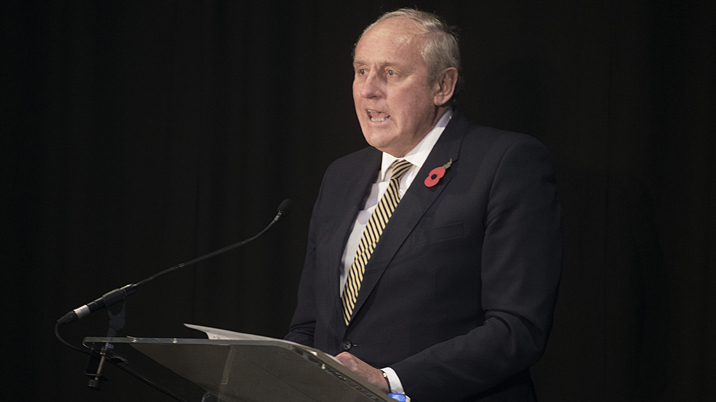
Welcome home
After the briefest of retirements, the master is back in charge of his universe, opening up a new front in his never-ending war against non-right-thinking people – and with a more like-minded sidekick riding shotgun.
Paul Dacre identified his new target (well, an old target with a new name) in a letter to the Times in which he announced that he wasn’t, after all, going to reapply to be head of Ofcom. Nobody, he wrote, of “an independent mind” and “unconnected to the liberal left” stood a chance against The Blob – aka the Civil Service.
In choosing the term, he was reviving a descriptor employed by Michael Gove as education secretary seven years ago when he likened teaching unions and “progressive” educationists to an “unstoppable” eponymous amoeba in a 1958 science fiction film.
The Mail titles have since been assiduous in pointing up the dangers posed by the Blob and seem eager to rise to their returning editor-in-chief’s challenge of stopping it. In the ten days after the Times published his letter, we had “Rishi’s freeports nobbled by the Blob”, “How we CAN stop the Blob”, “Blob holding UK back”, “Now the woke Blob tries to ban Christmas”, “Attack on the unfit Blob” and “Beat the Blob: shake up our uncivil service”. The Telegraph and Rod Liddle in the Sun soon joined the chorus.
It goes without saying that “the Left”, “liberals”, “the woke” and the BBC – which is obviously a hotbed of all three – are also back in the firing line. Were they ever out of it? Well, I was sceptical of those who detected a softer tone during Remainer Geordie Greig’s three-year tenure as the daily editor and certainly saw no sign that he was betraying the Brexit that was, as Dacre had warned him, in the paper’s DNA. OK, Greig wouldn’t have labelled judges Enemies of the People or urged voters to Crush the Saboteurs, but his paper wasn’t exactly kind to Harry and Meghan or Jeremy Corbyn.
It goes without saying that “the Left”, “liberals”, “the woke” and the BBC – which is obviously a hotbed of all three – are also back in the firing line.
Political pandemic
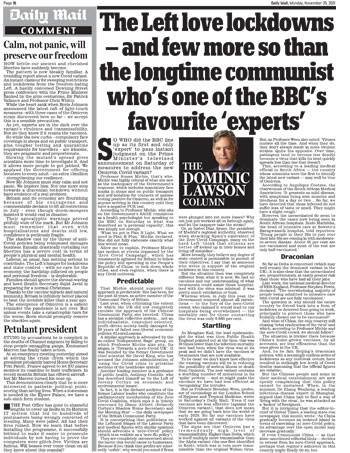
I did, however, notice that the Mail on Sunday became more strident under Ted Verity, who has now migrated to the daily chair.
But, boy, has the old / new regime come in with all guns blazing.
How about this for a headline, on Dominic Lawson’s column on Monday: “The Left love lockdowns – and few more so than the longtime communist who’s one of the BBC’s favourite ‘experts’”. I hadn’t realised that views on the pandemic and how to respond to it depended on your political persuasion, but now all is clear: Leftie remainers wear masks, right-minded Brexiters want everything back to normal. But anti-vaxxers (often, I’ve found, from the libertarian right) are bad. Especially at the school gates. I digress.
Lawson was dismayed that the BBC’s sole “expert” on the Government’s response to the new omicron variant was Professor Susan Michie, who advocates the introduction of “Plan B plus” to curb the spread of the virus. To be fair, the Express and Times were also exercised by this choice.
Michie is at least a member of the SAGE committee and, as such, has a legitimate voice in the argument. Can the same be said of the professor taking the opposite view on the same page on Tuesday?
This time, the title was “Omicron may even spell the END of the pandemic. So why is it being treated like Ebola?” That’s some Read Me headline. It took three paragraphs for Professor Angus Dalgleish to reiterate who the villains were here: “The inevitable chorus of gloomy voices has begun to sing again: that unholy alliance of scientific 'experts' who have been given blanket coverage by the BBC and Left-wing media so often during this pandemic.” At this point, it’s worth remembering the full extent of the extra restrictions that have been imposed to deal with Omicron: we are being asked to wear a mask in a shop or on a train.
If Professor Michie’s communist political leanings are ripe for mulling over, in the interests of openness, why did the Mail not feel it necessary to mention that Professor Dalgleish stood as a UKIP parliamentary candidate in 2015? It seems to me that the point of a medical “expert” is not where they come from politically, but whether their area of expertise is relevant. Michie is a psychologist, Dalgleish an oncologist. I would have been far more interested to hear / read what an epidemiologist had to say. Were none available? Or were both organisations guilty of commissioning opinion from someone who could be relied upon to supply the required viewpoint?
Reflections on Dacre’s Ofcom withdrawal
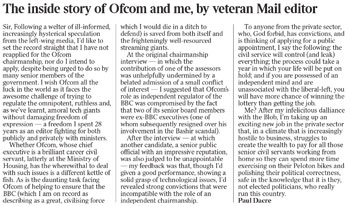
The fact that Dacre chose to make his Ofcom withdrawal announcement in a letter to The Times would seem to indicate that the paper is still the repository for the thoughts of the eminent – in spite of challenges in the past few years from the FT and Independent. Like those two, the Thunderer’s letters page seems to have been able to keep a position of relative neutrality, of being open to all, while those firmly of the Left or Right gravitate to the Guardian or Telegraph.
Given what he has written about them over the years, Dacre would obviously never write to the FT or Guardian; the Independent is online only and the Telegraph’s stature is in decline. The Times suited his purpose.
It also offered a level of support he may or may not have anticipated.
A leader on the opposite page, headlined “Blob rule”, accepted Dacre’s claim that he was told he was rejected because he had shown “strong convictions”, and concluded: “If public trust is to be maintained it is vital that the panels judging that merit are not exclusively drawn from a narrow, self-serving elite. Independence cuts both ways. A media regulator that has room on its board for two former BBC executives but not a former national newspaper editor risks failing this basic test.”
Dacre’s letter had also stated that he was on record as describing the BBC as “a great, civilising force which I would die in a ditch to defend”. That is not how many would characterise Dacre’s abiding attitude towards the corporation.
To have shown such well-documented antipathy towards an organisation you wish to regulate might legitimately colour the appointment panel’s view of your suitability. Take, for example, Dacre’s own attitude towards “the Press-hating” Impress and its suitability as a press regulator.
Computerphobe
But Ofcom does not regulate only the BBC. It also has oversight of all telecommunications and the internet – which, with the Online Harms Bill, is going to be a key element of its work. Dacre famously refuses to use a computer, read emails or engage with social media, which one might think would be a prerequisite of anyone with responsibility for making sure that what appears on them is safe.
The arguments against Dacre’s appointment to the role have been well aired – and the Times leader touches on the risk to the Government of cronyism allegations had he been installed – but I have never before seen the fact that he once edited a newspaper put forward as a ground for his rejection.
Nobody has said there is “no room on the Ofcom board for a former national newspaper editor”; it just happens that the only applicant fitting that description was deemed “unappointable”. The Times might just as easily have claimed there was no room for someone born in Enfield.
To have shown such well-documented antipathy towards an organisation you wish to regulate might legitimately colour the appointment panel’s view of your suitability.
The blame game
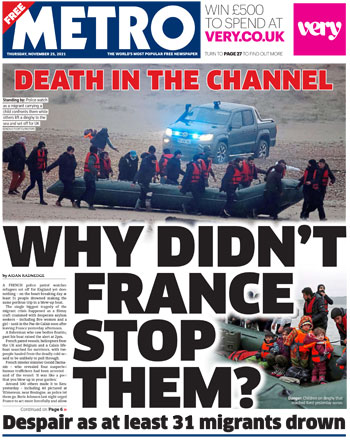
It is always frustrating when you are reliant on somebody else to help you out of a difficult situation. No matter how much you may want to scream, “Why can’t you just get on with it?”, that isn’t generally the way to secure the result you want.
This isn’t a particularly insightful observation. Yet this life lesson that most of us learnt by the time we got to secondary school seems to have been missing from our newspapers’ curriculums. “Why didn’t France stop them?” demanded Metro after 27 people drowned trying to cross the Channel in a paddling-pool-strength dinghy. “Shameful”, declared the Sun over a photograph which it described as “French police idly look on as rafts head to UK”. At least the overline urged “leaders” plural to act. For the Express and Mail, as ever, the French alone were culpable and it was the Prime Minister’s interpretation of events that was the top angle: “PM: smugglers getting away with murder” and “You’re letting gangs get away with murder”.
Excuse me, but isn’t the main story here that people died, not “who can we blame”? There will be plenty of time for that later.
That photograph of the refugees carrying their raft along a beach in front of a police car did look pretty damning – but they were doing nothing illegal and they hadn’t taken to the water.
Coverage of the “migrant crisis” – there are actually fewer people crossing from France to Britain than in previous years, but they are doing so in plain sight rather than stowed away on lorries – has made much of the fact that we are contributing to the cost of deterring them. “Paying the French to do their job” as the Express so charmingly put it. But we have paid only a fraction of the sum promised and that total is only a fraction of the cost of patrolling a very long coastline.
There has also been insufficient recognition that France has actually thwarted as many people trying to get over the Channel as have made it. This is in spite of the fact that nearly every asylum-seeker interviewed has admitted to having tried several times and been turned back – clear testimony to counter claims of French inaction. Our papers are reluctant to join the dots; France is doing what it can to solve what is essentially our problem.
And then Boris Johnson embarks on another round of megaphone diplomacy and the Express is there to amplify his message, announcing to its readers “UK troops to patrol French beaches” – never mind that President Macron has said “Non” even before the paper has gone to press. The paper really needs to learn that just because our Prime Minister wishes something, doesn’t mean it’s going to happen.
We have had six years of shouting about sovereignty, yet the whitetops can’t grasp the notion of other nations wanting it too. Imagine if the French wanted to start patrolling our streets, if gendarmes started detaining people to stop them leaving Kent for the Pas de Calais. That would go down a bundle, wouldn’t it?
There has also been insufficient recognition that France has actually thwarted as many people trying to get over the Channel as have made it.
Missing the human story
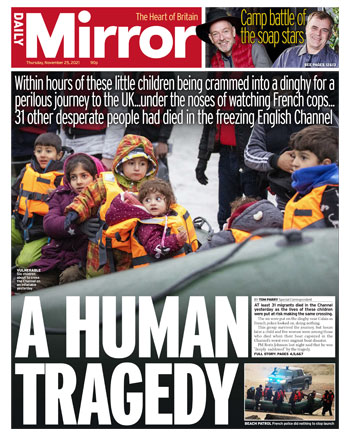
What I really wanted to know about this tragedy was who the victims were – and who are the people huddled in France waiting to risk their lives. Not that they were / are “migrants”, but who these people were before they were robbed of their personal identities to become cash-cows for traffickers and weapons for people with a political agenda. Almost every news organisation sent reporters to Calais and Dunkirk after the tragedy, but none answered these questions. The Mirror, which produced the best “human” spread on Friday, wrote about one young man described as a “former electrical engineering student”, the Times found an Afghan translator, the i a psychology graduate. And when the identities of the dead were released, many showed a spark of interest in the pretty young bride coming to be with her husband.
But that was it. For page after page, in paper after paper, the formula was “another migrant, Aziz”, “Jamal, an Iraqi Kurd”, “Amman, a gangly, cheeky Eritrean”. All spoke of their desperation and determination to reach the UK, of the cold-heartedness of the smugglers, and of how they would not be put off by the deaths of those who went before.
But while these interviews had a veneer of humanity, there seemed a distinct lack of interest in finding out more about them as individuals beyond their country of origin. The traffickers are charging upwards of £5,000 to get these people to where they want to be, where did they find the money? By their families selling their homes? To whom in a devastated country? There must, somewhere along the way, be earning power for people to have accrued the necessary cash.
Not all the refugees are teenagers or pregnant women despatched as front-runners by older relatives; some are in their 30s and 40s, they will have a trade or profession. Let’s hear about them please, and not reduce everyone to their nationality and the fact that they are “still handsome”, even with gap teeth.
But while these interviews had a veneer of humanity, there seemed a distinct lack of interest in finding out more about them as individuals beyond their country of origin.
Not cricket
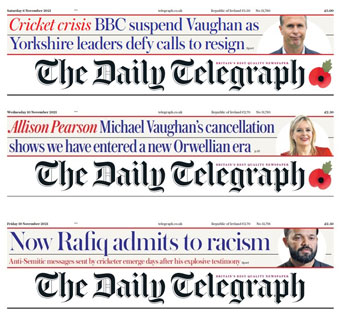
Azeem Rafiq’s racism allegations had a seismic effect on Yorkshire cricket club, costing it sponsors, its position as a Test venue and a number of directors. The story – and particularly his testimony to a Commons select committee – transcended sport and made the news pages of almost every paper.
The Telegraph, however, decided to keep the issue in its sports section, with occasional pointers from the nibs panel at the foot of page 1. The coverage in sport was extensive – a series of splashes – and there was a leader on November 6 urging the ECB to conduct a rigorous investigation into the “shocking scandal” and to act quickly to foster a dramatic change in culture.
On the same day, the over-the-titlepiece puff announced that the BBC had suspended Michael Vaughan in response to Rafiq’s claims that he had made racist remarks, claims Vaughan denied. This was the first time the story had broken out of that bottom row of briefs. The Telegraph’s sudden burst of interest could, perhaps, be explained by the fact that Vaughan is not only a former Ashes-winning England captain, and as such something of a hero, but also a Telegraph columnist. There’s no doubt the paper and its readers are invested in him.
A few days later, Vaughan was back in the same slot – this time courtesy of Allison Pearson, who described his “cancellation” as Orwellian. Rafiq himself made his first appearance at the top of the front page on November 19, with the headline “Now Rafiq admits to racism”.
“Unfortunate” would be a generous word to describe the paper’s decision to make its biggest fuss of the man at the centre of controversy on a day that reflected badly on him. There’s no denying it was an important and relevant development, but was it the most significant turn of a long and winding story? Still, there was a consistency in that this aspect, too, was reported in detail in sport rather than news.
Since then, the paper has been staunch in its defence of Vaughan. There has been pressure on the BBC to reinstate him, a column by Simon Heffer saying that his “persecution by the ‘virtuous’ mob demeans us all”, and a piece by Monty Panesar urging that his former captain’s reputation should not be trashed “without due process”.
It’s always a tricky one, reconciling the principle of “innocent until proven guilty” with the need to take action while the facts are established. And we are unlikely ever to resolve this one with two men giving diametrically opposed accounts of events long ago. The BBC’s argument that it is unconscionable to have a commentator who is at the centre of a swirling news story is persuasive. This isn’t cancel culture in the sense of “We won’t give you a platform because we disagree with you”, but a case of “when the messenger becomes part of the story, s/he has to retreat”.
We are unlikely ever to resolve this one with two men giving diametrically opposed accounts of events long ago.
Tweet in haste, repent at leisure
This is, of course, not the first time this year that the ECB has got itself caught up in the maelstrom of racism, sexism and “cancel culture”. In June, it excluded Ollie Robinson from the Test squad because of offensive tweets he had posted as a teenager. As with the Rafiq case, the Telegraph’s coverage was consistent: page 1 nibs and full stories in sport – even when the Prime Minister felt minded to opine. There were a couple of op-eds: “If society can’t give a sinner a break it just isn’t cricket” and “Cancel culture makes it impossible to learn”, and a leader bemoaning so-called “offence archaeology”. This decreed that the sexist and racist tweets had been posted nearly a decade ago. Robinson had apologised when they came to light, regretted them, and said he had learnt his lesson. “There the matter should have ended,” the leader concluded.
But the sports department was not going to let it rest there. On the very same day, it ran a spread headlined “The Ollie Robinson debate: was it right for the ECB to ban him?” As is the way with these enterprises, one writer was commissioned to argue “Yes”, another to argue “No”. The dominant piece, at the top of the page was the “Yes” one. It was written by – you’ve guessed it – Michael Vaughan.
His conclusion was very much “pending an investigation”, but he said the tweets were unacceptable and would stick with Robinson for the rest of his life, even if he were eventually remembered as a great all-round cricketer. He should be punished, but not “thrown under a bus”. People make mistakes when they are young, but everyone should remember that anything put on social media was on record forever, the equivalent of giving a newspaper or television interview.
Now Vaughan is himself being picked up for tweets – from only four years ago – in which he told Adil Ray that “YES”, Moeen Ali should go round asking Muslims he didn’t know if they were terrorists, “if it’s going help our kids future and environment become a safer place”. And for another, from 2010, where he said “Not many English people live in London… I need to learn a new language”. But you know that only if you look on social media rather than in the Telegraph.
Maybe that’s fair enough. After all, the paper believes that people should not be pilloried for ancient tweets. Which leaves just one final question: why, then, did it point up Rafiq’s anti-semitic messages from ten years ago, for which he – like Robinson – swiftly apologised – at the top of the front page?
But you know that only if you look on social media rather than in the Telegraph.
And in other news, England win 20-0
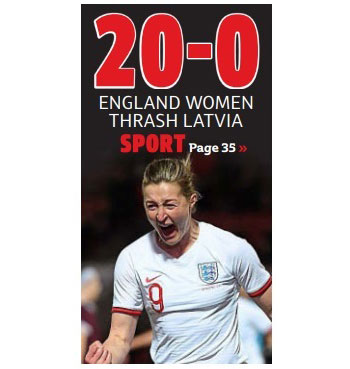
From cricket to football and a cause for celebration. England beat Latvia 20-0 in a World Cup qualifier on Tuesday. The No 9 scored a hat-trick to become the country’s leading goal-scorer. The team are now top of their qualifying group, having won every one of their six matches so far and with a goal difference of +53. I’m sure you read about it on the front pages – or, if not there, the backs?
No? Well, it was definitely on the covers of the i and Metro. And the rest found a slot somewhere in the run of sport after Jack Grealish not doing so well and Pukki scoring for Norwich and Ray Kennedy dying and a bit of speculation as to who will be the next full-time manager for ManU.
The Sun was so chock full of goodies it didn’t even have room for the England triumph in the main book, having to leave that delight for page 3 of the Goals supplement.
Odd, since this wasn’t the B team or the under 23s or the juniors. It was the top-flight squad.
But it was the women. So who cares?
Maybe not now, but everyone will if they make it to Australia and New Zealand and win in 2023. To help you get ahead of that game, above is hat-trick heroine Ellen White.
Meanwhile, the weather in London…

To be locked in a pub for three days – with or without an Oasis tribute band – may be some people’s idea of heaven. But there could be few bleaker British landscapes last weekend than that outside the Tan Hill Inn. Cue snow pictures and “Brrrr!” headlines across the board, not to mention speculation about a white Christmas. Next thing you know there’ll be little moppets in red bobble hats frolicking on sleds.
Storm Arwen did more than chill us all to the bone. It brought devastation to communities in Scotland, Wales and the North. So much so that the Sun was moved to report on “Snowvembrrrr!” on page 23 and the Mail to describe the “Chaos on the commute” on the 6-7 spread. By yesterday morning, the story had fallen out of nearly every paper.
If you are still convinced that there is no North-South divide and that our national press is not London-centric, imagine the coverage if tens of thousands of people in Surrey found themselves with neither power nor water for four days.
Oh, and I missed it first time round. The Express and Sun (see picture above) both had people frolicking on sleds – even if they were not wearing red beanies – on day one. Bet that made people in Northumberland smile as they shivered.
Can Christmas be saved?

Is it going to be a white Christmas? Is it going to be a family Christmas? Is it going to be Christmas at all? Once again, we are holding our breath to see if Boris can hold the line and stop the latest Covid terror separating us from that turkey dinner. So here’s a quick update on the “Saving Christmas” stakes.
The Express, naturally, leads the way with nine front pages (six of them splashes) promising that Christmas can be saved and one warning that it’s under threat. The Mirror trails in second place with three. The Sun, Times, Sunday Times and the i have all mentioned it once; the Mail on Sunday has had (as we saw above) it cancelled by the “woke Blob”; and the Daily Mail has passed on Johnson’s orders to “Keep calm & and don’t let new Covid ruin Xmas” (an ampersand and Xmas in one heading?!) and “PM: don’t cancel your Christmas”.
Since it is apparent that the booster is required to sustain the Boris boosterism, it’s worth also updating the latest count of vaccine splashes. As expected, the i comes top – but only just seeing off a late challenge from the Telegraph papers. Perhaps the most surprising thing here, though, is that the Star has led on jabbing only three times in the past year. That doesn’t come close to the number of ministerial clowns it has put on its front – and only just beats its Line of Duty tribute acts.
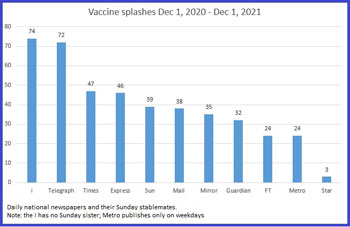
Speaking of which…

It was a great line in a great series. But the trouble with great lines is that you remember them, so it's best really to pick your moment when to use them in your splash headlines. Twice in a year is once too many.
A quick word on an old chestnut

Whatever you think of our courts, legal system, parole boards etc, those who work in them do their best to keep us safe and see justice served. They do not set out to endanger the public.
I was taught decades ago that the construction in this headline is unfair and inaccurate; it suggests that criminals are released so that they can reoffend, which is patently not the case.
Criminals are not set free to rape, murder or rob, but because there is no justification for depriving them of their liberty. Which is something papers like the Mail cherish in other circumstances.
Front page of the fortnight
In a couple of weeks of huge stories that should have had some storming covers, none of the nationals came close to anything memorable. So this was the stand-out winner from the Sheffield Telegraph on the axing of the northern section of HS2.

Last word: I see that in its day two coverage of Keir Starmer’s reshuffle, the Mail reports “Keir’s Remoaner army takes over” (note the capitalisation). Remoaner: now there’s a word we haven’t seen a lot this past year. Welcome home, Paul.

Liz Gerard’s Notebook is a fortnightly column published in the InPubWeekly newsletter. To be added to the mailing list, enter your email address here.












